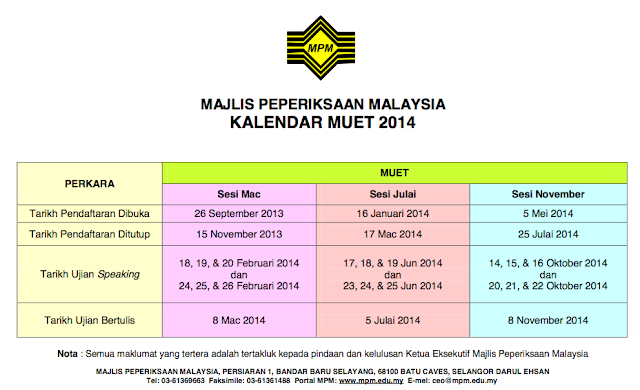A quick history of <b>MUET</b> - Around Us - Blogger - Blog Muet |
| A quick history of <b>MUET</b> - Around Us - Blogger Posted: 09 Jan 2014 05:01 PM PST A quick history of MUET MUET is t he acronym for Malaysian University English Test, put into place in 1999 by Malaysian Examination Council (MEC), based in Selayang, Selangor. The paper contains four main parts, catering for all much needed communicative skills; listening, speaking, reading and writing. Since its inception 15 years ago, a number of changes and tweaks had taken place to ensure MUET is kept relevant to the needs of the academia and industries. In 2008, severa l big changes swept through the constructions of the subject that affects Listening, Reading and Writing. Gone are MCQ-based listening questions, so was summary and also long texts with fewer questions. In their places now are what we all see today which have stayed unchanged since the big sweep in 2008. In February 2011, another big change took place - prior to that year, MUET exams only took place, in twice, July and November. But since that year, MUET exams can be taken thrice yearly; March, July and November. It is interesting to note that today, MUET is the only public exam in school which charges RM100 (correct at the time of writing) per sitting in contrast with all the other free public exams. To a number of universities, MUET band requirements are of utmost importance as the entry requirement for certain courses. For example, a minimum of band 4 is required for Law and Medicine courses, while other universities, exit requirements. Which means, a student needs to achieve the min mum prof iciency band needed for the course before they can graduate. Hence, MUET exam can be considered as an integral part of any self-respecting Form 6, pre-university or university student. Today, MUET plays a very important role as a yardstick to gauge the level of English proficiency among students and employers use MUET results to determine their future employee"s ability to communicate effectively in English. Now let's look at the four papers in MUET that every candidate will sit for. In general, Speaking paper will be held ahead of Listening, Reading and Writing papers by about three weeks. Listening (800/1) This paper assess the ability to comprehend various types of oral text of varying length and level of complexity (content and language) The following areas are tested: knowledge, comprehension, application, analysis, synthesis, evaluation. Some of the possible genres are lecture, talk, discussion and news. The format of the question includes MCQ, fill in the blanks and sentence completions. Speaking (800/2) This paper assess the ability to make individual presentations (2 minutes) and take part in group discussion (typically 10 minutes) on a wide range of contemporary issues. The following areas are tested: accuracy,f luency, appropriacy, coherence and cohesion, use of language functions, managing a discussion and task fulfilment. Some of the possible issues are economy, education or health. The format of the paper includes individual presentations and then group discussion. Reading (800/3) This paper assess the ability to comprehend various types of text of varying length and level of complexity (content and language). The following areas are tested: comprehension, application, analysis, synthesis and evaluation. Some possible genres are articles from journals, academic or literature texts. The format of the questions includes six articles with 7 or 8 questions each (True/False/ Not stated and the standard higher order thinking MCQ questions). Most of the articles are written by native speakers of English with varying content and language complexity. Writing (800/4) This paper assess the ability to write various types of text covering a range of rhetorical styles. The following areas are tested: - accuracy - appropriacy - coherence and cohesion - use of language functions - task fulfilment. The genres are report (question 1) and essay (question 2). The format of question 1 (report) is making analysis and sy nt hesis based on the data given (in the form of table, chart or graphs) all within 200 words and question 2 (essay) is writing an opinion-based essay or argumentative essay. The Scoring Guide Here's a quick scoring guide from Band 1 to 6 Aggregated Score Band The User is a..... 260-300 6 highly proficient user 220-259 5 proficient user 180-219 4 satisfactory user 140-179 3 modest user 100-139 2 limited user below 1 very limited 100 user Let's take a look how each paper contributes to the aggregated score (in percentage) Listening - 15% Speaking - 15% Reading - 40% Writing - 30% In short, Reading paper contributes the biggest percentage towards the 300 score. However, as many candidates who have ta ken t he exam would attest, this paper is probably the most difficult paper to face due to two main factors. One, the articles are written by native speakers, hence some language expressions, sentence structures and word choices are not very familiar to our candidates. And two, 45 questions with 7 or 8 articles prove a challenge to be completed within 90 minutes since this only give an average of 2 minutes or less for each question to be attempted not including reading the texts. As a result, some candidates give up halfway through the paper. Well, I think I'll stop here for now. See you in the next pull out. Remember: Practice makes perfect! ~ BH |
| You are subscribed to email updates from muet past year paper - Google Blog Search To stop receiving these emails, you may unsubscribe now. | Email delivery powered by Google |
| Google Inc., 20 West Kinzie, Chicago IL USA 60610 | |








+2014.png)


